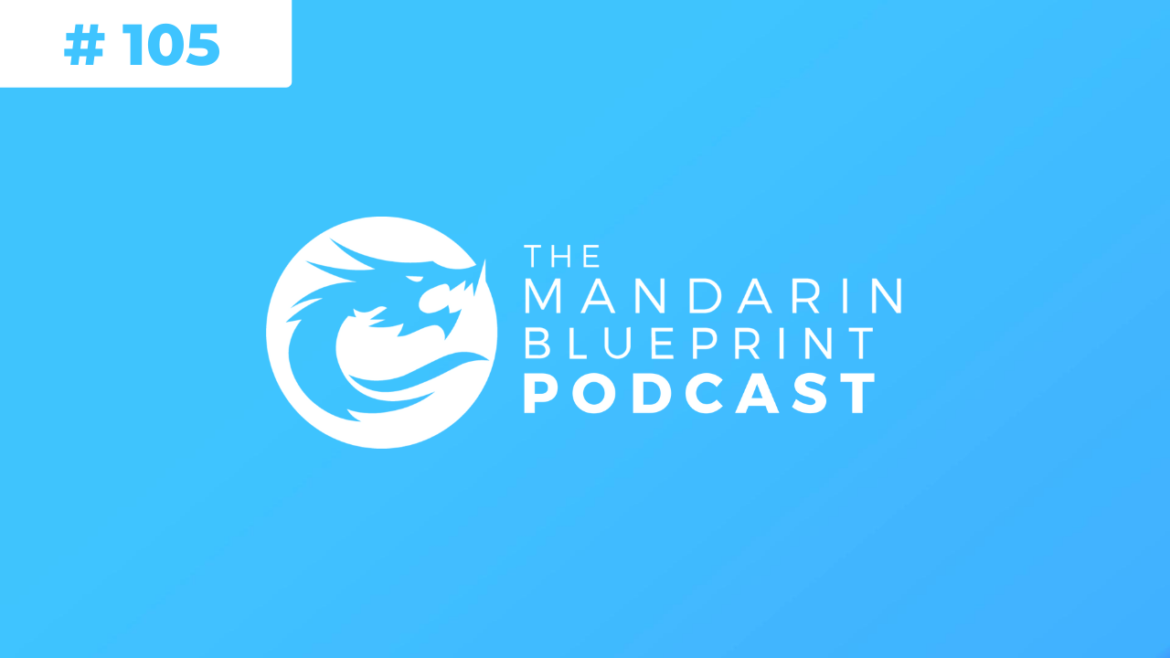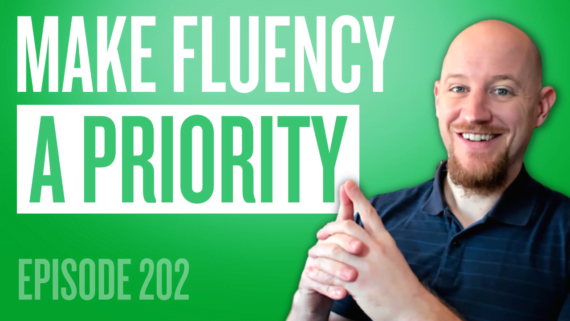
105. Patience and Consistency in Learning Mandarin
欢迎光临! Welcome!
You can now subscribe to the podcast by the links below, or you can subscribe by copying the following URL into your favorite podcast APP.
The Mandarin Blueprint Podcast focuses primarily on The Blueprint online curriculum. Creators Luke Neale & Phil Crimmins answer questions and comments, discuss topics related to China and Mandarin learning, and have special guests.
Want to learn how to speak fluent Chinese fast? Join our free Webinar right here.
欢迎光临! Welcome!
You can now subscribe to the podcast on iTunes, Stitcher, Spotify, or you can subscribe by copying the following URL into your favorite podcast APP:
https://www.mandarinblueprint.com/feed/podcast/
The Mandarin Blueprint Podcast focuses primarily on The Mandarin Blueprint Method online curriculum. Creators Luke Neale & Phil Crimmins answer questions and comments, discuss topics related to China and Mandarin learning, and have special guests.
0:00 Affiliate Link & Reviews
Become a Mandarin Blueprint Affiliate
Leave us a Google Business Review 🙂
0:00 Comments & Emails
Beck Wintsch by Email
Dear Phil and Luke,
I started learning Mandarin two months ago to cure pandemic boredom but now am fully determined to become fluent in the language.
I heard about your method in the beginning when I was doing research on different courses and the Hanzi Movie Method intrigued me. I had begun learning the language on one of the many gamification apps which was fun in the beginning but learning characters felt like a chore and trying to write alien symbols. I finally cracked down and started paying for a real course Chinese For Us which is one of the best-reviewed courses next to your guy’s.
While this course is great it only goes up to HSK 2 and is a bit slower going because how thorough things are covered. Learning characters are still taught more in the traditional way so I still struggled, even though I had a great foundation from their stroke order course. I eventually got Skritter which helped but I still forgot a lot and even with some simple mnemonics.
Finally, I took the time to read the ebook for the Hanzi movie method and created a list of the sets actors and started to implement the method in the learning of characters. Now I’ve learned more characters in the last two weeks than the rest of the two months. Going from zero to well over 140 and counting. While Chinese For Us is a great course, honestly without Skritter, Pleco, and the Hanzi Movie Method I wouldn’t be as progressing as fast. So my goal is once I reach HSK 2 to switch over to the Mandarin Blueprint since I enjoy learning using this method so much. I used to despise writing characters and would rather type, but now it’s a fun and enjoyable process to actually do writing practice.
When I first read about the Mandarin Blueprint and the claims of general fluency in 6 months to a year, I honestly thought you guys were just spewing false advertising and grandiose claims. Boy, do I think differently now. I’m learning an average of 6 characters a day which to me I thought may not seem a lot at first until I calculated that could be over 2,000 characters in a year, which blew my mind. Thanks so much guys for the hard work that went into developing your method. You have boosted my confidence and have made learning Mandarin a fun and enjoyable start to a life long journey.
谢谢,
Beck
8:21
Ric Santos by Email
Dear Luke and Phil,
Thank you for your encouragement and tips about Shadowing. Since I get easily tired when talking, more so when there is an effort like voicing out in Chinese, I pace myself in chunks of 10 mins. I resist the temptation to rush to the next lesson, and I also resist the temptation to memorize sentences because I would forget them soon enough. The present setup makes use of the SRS and it takes care of this quite effortlessly. I am getting familiarized with the words, phrases in context. And I know I will meet these words again on their due dates.
So The first 10 mins or until I get tired, I shadow the Anki sentences or dialogues as the cards come up. When tired, I just listened without looking at the screen and find out whether I understood what was said. I press R again to listen. Then I look up and see what were the words I did not capture correctly. At the same time, I try to understand the recording in the Chinese way, that is, if I understood the message right. Most of the time my own translation is not at all good or current English, but if the message is the same, then I am good. If there are particular words or phrases that are new and strange to me, I replay the recording and focus on the coming word if the sound of it will get accustomed to my ear. Only then I can say I heard the word. Then I can practice writing them and study the meaning ( eg 麻烦, 不错,随手) I find all of them very engaging
My slow progress perhaps is also due to my curiosity when I see a new word like 麻烦, 错, 随. I consult Pleco, 2 other books, and a dictionary and delve into the meanings of the words based on the characters. I know it could be a waste of time, but I do enjoy deciphering and checking their origins…and why they were used with that meaning. Of course, there are dead ends too.
Recording my own voice is an invaluable fact-checker. I heard myself reading 妈妈 爸爸 like it was “Māma-Pāpa” instead of ” …Pàpa”. Warm-up is important otherwise the recording won’t be good. I realize I cannot gloss over words when I am tired vocally, and it will show, like noticing when I do not do the sandhi rules for 你有,我想,不行 and many more. Annie and Jerry’s differences come out very clearly. But I find this good training and preparation that there will be differences, but the context and emotional expressions will help me get the message.
I also take time to review my movies and see why I missed out a couple of words…and then I edit some of them especially when the “room” is not immediately coming out of the story. I tried listening to the pod while preparing breakfast, but I got distracted in cooking. So I listen to the pod while washing the dishes instead.
If I wake up at an earlier time, I will review the Anki cards. During the day, I read a line or two, write a line or two in chunks of 10 minutes, in-between hours.
But study time is the afternoon before dance exercise, then at night after supper. About 3 hours, until I go to bed. So an average of about 4 hours per day. I missed Anki review only once, and that was when I was under the weather.
So This is my short feedback. One thing for sure is that I trust in your guidance and tips, so I try not to overdo things. I do not burn the midnight oil. I think the difference with the other Mandarin courses online is that the MB is a tried and tested, multi-dimensional yet holistic method, with lots of technical aids, always with sincere and meaningful support from both Luke and Phil, and most of all, it is working!…on schedule!
Thank you, Luke and Phil.
Ric
我明天会学Level20.
15:59
Ric Santos by Community
In order not to confuse the tones for words not yet in my level (19), is it wise to start a mini-movie at least to get the tones right? For example for the tone of 元 as in 公园 and 医院, I just put my Yu actor in the kitchen for 园; and as for 院, my Yu actor is in the backyard. The movie is incomplete, but it helps me in remembering the tones. However, I do not know if it is wise to start doing these incomplete movies at this stage. I have a separate notebook where I put my temporary movies. What is your experience in incomplete movies?
17:09
Ann Bihari on Make a Movie 应
400 characters and approximately 700 words (not counting the top-down words we also recognize due to frequency)! It is so very satisfying how much progress is possible. I echo everyone’s expressions of excitement, enthusiasm, and gratitude for the course. Thanks again, you guys!
17:57
William Beeman on New Vocabulary Unlocked! 现在
Hi guys
Is there a difference between 肚子很痛 and 肚子很疼? Both 痛 and 疼 seem to indicate pain/hurt and they sound vaguely similar. Thanks, as always.
22:59
Ric Santos on New Vocabulary Unlocked! 开门
Can 麻烦 máfan be used to start a sentence asking for a favor?
24:57
Gary Cheeseman on New Vocabulary Unlocked! 后天
Can 我们后天见 be also used in a metaphorical sense?
As in, “We’ll see (find out) the day after tomorrow”
Answer: 后天看吧
26:27
Alex Sumray on Vocab Unlocked from 妹
Hi there,
I just wondered if there is a most common way to say siblings, say when asking if someone has any siblings?
Answer: 兄弟姐妹
27:21
Nacho En on It’s a Word! 份
So is there any difference between 一份 and 一块 or both have the same meaning?
A Gift 一份礼物 yī fèn lǐwù / A Newspaper 一份报纸 yī fèn bàozhǐ / A Contract 一份合同 yī fèn hétong / A Report 一份报告 yī fèn bàogào
A Rock 一块石头 yī kuài shítou/ A Piece of Cake 一块蛋糕 yī kuài dàngāo / A Bar of Soap 一块肥皂 yī kuài féizào / A Piece of Meat 一块肉 yī kuài ròu
30:44
Igor Alenc on It’s a Word! 开
I don’t get the usage of 打 in 打开书
32:08
Rick Angleland on New Vocabulary Unlocked! 目的
I came across this as 目的地. How are they different in meaning?
33:44
Jiggy-Jay Diderich on Make a Movie 两
Would you recommend making a movie for characters you already are very familiar with?
34:48
Ric Santos on New Vocabulary Unlocked! 每天
I like how Luke explained 记 住 as what we have memorized is currently living in our brain. The second part- 记得- somewhat resonates with my depiction of 得 as something that MUST grab; So I understand 记得 as a memory grabber; and as Luke explains, it brings out what we are trying to remember. Thanks for the explanation.
38:44
Micaela Ellison on It’s a Word! 快
For the first sentence, is the second 飞 optional because we know the subject is an airplane? So could we say 飞机快要起了?
40:17
Paulette Jenner on Special Effects & Memory Athletics
I am almost alarmed at how much fun I am having with this so far. I love the imagination and creativity involved! And you’re right – I’m not going to forget the image of Sean Connery hurling razor blades in my kitchen. I imagine it ricocheting off the super old 70s-green refrigerator my grandmother had, just for fun.
40:58
Sebastien Lessard on It’s a Word! 说
I’m curious, at what level will we have enough words to begin the reading part of your course?
46:05
Dom Thomson on Vocab Unlocked from 饺
As an indicator of how quickly I’m going through the course, I just sat down to learn 10 characters and it’s taken 40 minutes with minimal distractions.
Sometimes this is a bit quicker if there aren’t many new words unlocked. Sometimes it takes longer if the sentences trip me up but this feels like a good average indication for this stage in the course.
It definitely feels like it’s getting faster because reading the sentences is much quicker. 10 new characters in a day used to feel much more daunting but now I can manage 20-30 on a weekend day by doing a few of these chunks.
Of course, there’s still the Anki which takes up more time so I’m doing about 2/2.5 hours a day in total to get through a level per week.
I’m on track to finish the course in mid-November having started Pronunciation Mastery at the start of Feb. I invested less time per day before lockdown and stalled for about a month in March so I reckon 2 hours per day for 9 months is a far indicator of my progress through the whole course.
I haven’t done the Conversation Connectors deck yet and I only did the required sentences early on. I’ll go back to CC when I start speaking more but I think leaving out the optional sentences was the right call at the time. I had thought I’d come back to these but now they’d be far too simple.
51:15
Andreas Lienemann on It’s a Word! 寄
I actually found the answer to this.
The Outlier dictionary in Pleco gives me the following definition “tree” for 信: 1(orig.) honesty, -> 2 to trust, to believe, 3 -> person who delivers letters (i.e., a trustworthy person. Only used in ancient texts), 4 => letter, correspondence, 5 => message, information.
So that makes complete sense. Of course, I would only have a person I trust to deliver my letters!
I was just not sure if we’d covered this alternative meaning of the character before. I don’t think we did. Maybe it’s a good idea to list it here in this lesson?
It’s so awesome how Chinese employs such stringent & precise, yet simple structures for its expression. It’s so efficient as well!
In that way, it is definitely the most beautifully constructed language of the ones I have learned; and those are quite a few.
54:12
Rick Angleland on Level 35 Unlocked Conversation Connectors
我们先到这吧。
I need to feel how the parts work together so I can remember it, but I can’t get a handle on this one. Can you please break it down a little?
56:16 Movies!
This blog post explains the theory behind Movie Scenes and learning characters.
Robert Carver on Make a Movie 亭
Tyra Banks (ti-) is in the kitchen at the Lake O apt (-eng) with Abraham Lincoln (亠 口 ), furiously fighting off a hoard of vampires (from the movie Abraham Lincoln Vampire Hunter). Abe wields his Harpoon (冖), while Tyra swings a bloody Meat Hook (丁). There are so many vampires that they are backed up onto a PAVILION, where after a fierce battle they stand victorious in the middle of the pavilion, and Abe swoops Tyra into a kiss as the camera zooms out and up into the sky, centered on the pavilion with the dead vampires circled around it.
57:56
Ramona on Make a Movie 难
My N-actor is trying to play (on) his new beautiful Chinese flower pot drum (又).
His cute green talking parrot (隹) keeps repeating: it’s DIFFICULT, it’s DIFFICULT.
You bet is DIFFICULT to work with “somebody” who keeps interrupting! 🙂
59:14
Tyson on Make a Movie 易
Since this character is a component in many other characters, I think that it would be good to make a separate prop for it- maybe a Staples “That was easy” button, or a can of Easy cheese, or Eazy-E, or…
1:00:07
Evan hall on Make a Movie 起
kate is in my childhood home in the bedroom. shes is moonwalking around a snake eating itself. little did she know, that this was an ancient ritual and the snake began to RISE UP into the air and float.


